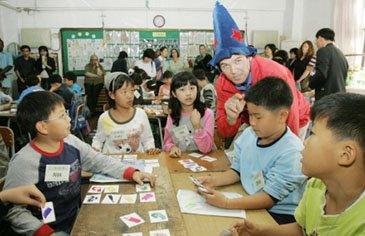
S. Korean kids learning English from a native speaker in Seoul
Koreans Make Big Sacrifices to Study Overseas
Families Separating So Kids Can Be Educated Abroad
By Anna Fifield
Financial Times Correspondent
Every morning when Park Jin-soo wakes in his studio apartment in Seoul, his wife and three children are just sitting down for dinner at their house in Montgomery, Va(Virginia). His family usually eats Korean food, although the children are no longer so keen on kimchi.
"They are Korean on the outside but American on the inside now," said Park, one of thousands of kirogi appa, the "wild geese fathers" who continue working in South Korea while their families migrate abroad for schooling.
"I sometimes feel miserable," he said of living alone. "But my wife and I feel very strongly that our children must have the best education."
More and more South Koreans are choosing to split their families to try to escape the country's grueling school system, which is based on endless hours of rote learning, in favor of a better education and a more balanced life abroad for their children.
Life in South Korea revolves around education. Graduating from one of the country's top three universities is a ticket to a good job. Thirteen of the 18 cabinet members attended Seoul National, the most prestigious.
Students as young as 10 attend hagwon — cramming schools — until 11 p.m. on weekdays and 8 p.m. on Saturdays. The average family spends a 10th of its income on private education, worth a total of $8 billion last year.
High school students live by the mantra "four in, five out" — a Korean saying reflecting the belief that those who sleep for only four hours a night will get into a top university but those who stay in bed for five hours will not.
So crucial is the university entrance examination that government offices and the Korea Stock Exchange open an hour late to keep roads clear and airplanes are grounded during the listening test. Out of a population of 48 million, South Korea has 2.6 million university students.
But many parents despair of the educational rat race.
"In Korea, parents educate their children by force, sending them to hagwon and over-educating them," said Park, a university professor. "In the U.S. my children enjoy living in a freer environment with more possibilities. And they all speak English."
A trend that started in the ritzy suburbs of Kangnam and Apgujong in southern Seoul has now spread across the country.
This year 192,000 South Koreans are studying at overseas universities, up from 150,000 five years ago. Meanwhile, the number of children attending school abroad has quadrupled to 16,500. The U.S. is the prime destination, but cheaper countries such as Canada, Australia and New Zealand are becoming popular alternatives.
Choi Byung-il, trade professor at Ewha Women's University, says the kirogi trend shows how South Koreans are becoming global consumers when it comes to educational services.
"Parents are not just sending them to a foreign university but they are immersing them in a foreign language, and that will be very important for career development," he said. "There's no question about the wisdom of that kind of thinking, but it comes at a high price."
While the phenomenon underlines the lengths that South Koreans will go to for education, it is a difficult trade-off, raising serious concerns about national identity and family values.
Many families feel torn about separating children from their fathers at such a pivotal stage in their lives — when their personalities and values are being shaped — and many kirogi children's knowledge of Korean history and language suffers.
